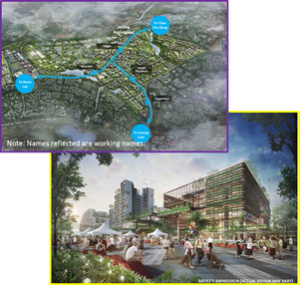The Housing & Development Board (HDB) will in November 2018 launch its first batch of flats in Tengah. the Minister of National Development, Lawrence Wong, in announcing the launch of the flats in Singapore’s newest town in over 20 years, said that it will be a substantial offering of around 1,500 flats, with a good mix across different flat-types.
The Minister said that HDB has always challenged itself to do better and break new frontiers, in imagining and planning each HDB town and estate. He pointed to Marine Parade estate as an example.
“Take for instance Marine Parade, which was made possible only through our land reclamation efforts. Over time, it has become a cherished home for many Singaporeans.”
Mr Wong said that Tengah estate will be no different, and that over the next few years, his Ministry will ensure that there is a steady stream of Tengah flats.
When completed, Tengah Town will grow to about 700 hectares, roughly equivalent to Bishan in size.

“In planning for Tengah, we wanted a town that is unique, like no other HDB town in Singapore (and have) conceptualised it as our first “Forest Town” (where) a green theme permeates the entire town,” Mr Wong said.
He added: “Tengah will be integrated with the surrounding greenery and rich biodiversity, and feature a car-free town centre. It will be a green, car-lite, and pedestrian-friendly town.”
With the recent announcement of the 24-km Jurong Region Line (JRL), residents in Tengah can also look forward to excellent connectivity, with four JRL stations connecting the town to Jurong Innovation District, Jurong Lake District and beyond. Within Tengah, the Ministry of National Development is also looking to enhance last-mile connectivity through autonomous vehicles.
In November 2016, Mr Tay Kheng Soon, an adjunct professor at NUS Department of Architecture School of Design and Environment expressed concerns about the destruction of the secondary forest in Tengah, and wrote a letter to the Forum page of The Straits Times (ST). He said that the letter went unpublished.
Mr Tay who is also the founding member of the independent think-tank, Future of Singapore, in saying that ‘calling Tengah a Forest Town is a bluff’, suggested that concerned Singaporeans should help prevent the destruction of the only large forest land on the west of Singapore from being built upon.
The following is the unpublished letter Mr Tay sent to ST.
“I attended a private discussion triggered by the Tengah project organised by pioneer architect Tan Cheng Siong and attended by a number of senior architects, former planners and a few younger building professionals on 27 Oct 2016.
Tengah is called a Forest Town, a bold attempt to urbanise a forest, taking Singapore’s City in a Garden concept to a new level. The key feature of the design is a linear forest park that threads through the town. The following are my own views in 3 phases:
1. Firstly housing is a socio-political thing. How does Tengah fit in? Here there are two key issues. One is the protection of asset value of existing flats owned by the old and second is affordability for younger voters. It would seem that Tengah addresses only the young. For the old, protection of their asset value is their greatest concern. Tengah is therefore not for them. More foreigners can boost asset value. Thus 6.9 or even 10 million, notwithstanding congestion. Grants help young buyers while protecting existing asset value of the old. Reverse mortgage and other financial schemes in addition are necessary. The problematic is if Tengah is only for the young, will it upset desirable family spatial relations?
2. Master Plan implications: In principle, building on brown sites is preferable to building on green sites. My YouTube video ”Singapore version 2.0” shows that land vacated by the port’s move to Tuas, can accommodate 1 million people stretching from Pandan Reservoir on the west to Marina East. Together with the availability of Paya Lebar Airport there should be no need to build on any precious forest land. Building on MRT sites plus infills within existing developments can add more floor space. Synergy with Cleantech Park does not need a whole new town next to it.
3. Tengah design shows no really new design thinking: The design is still not thought of as an intelligent living organism. When dwellings are clustered around an extensive nervous system like that of the human body is intelligence generated as people go about the routines of everyday life, going to school, to eat, to market, to shop, to civic events etc., new ideas, new people and new experiences free up learning naturally. Thus, like Acupuncture Meridians the Chi of the community releases collective intelligence and creativity for Singapore to prosper and be truly exceptional.”
—
A National University of Singapore (NUS) blog notes that:“Tengah is a secondary forest patch that connects the Western catchment area to the Central catchment. The plans for a new town means that the corridor connecting Western catchment and Central catchment will now be disconnected. Habitat fragmentation negatively impacts the biodiversity (or whatever remains of it).
It further said: “There are plans to make the new town in Tengah a “forest town”. But we know that even a highly planted urban area will never be able to support the type and abundance of biodiversity that a healthy intact forest of the same size can.”
—
If you are home-hunting, our Panel of Property agents and the mortgage consultants at icompareloan.com can help you with affordability assessment and a promotional home loan. Just email our chief mortgage consultant, Paul Ho, with your name, email and phone number at [email protected] for a free assessment.
